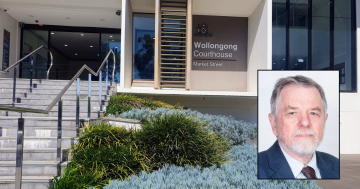
Wollongong solicitor Matt Ward says courtrooms can be like drama theatres, making them a tough place for introverts. Photo: Supplied.
It had to be asked.
Does the younger generation of legal eagles have a sense of humour when it comes to lawyer jokes?
Without hesitation, Matt Ward was quick on the draw with an answer: “What’s the difference between a lawyer and an accountant? Accountants know they’re boring”.
Boring is one description that could never be applied to this upwardly mobile solicitor who specialises in criminal and traffic law.
In just over a decade, Matt, 33, has attracted a swag of industry awards based on client testimonials, and is already a partner at Morrisons Criminal and Traffic Law Specialists in Wollongong.
He graduated with a law degree from the University of Wollongong in 2011, and has never looked back.
“I wasn’t one of those students who knew law was their destiny … I fell into it after some uni placements, and from that developed a passion for criminal law,” he says.
Memories of his first appearance before a Wollongong magistrate to mention an upcoming case remain vivid.
“I was a pot of churning nerves, but at the same time very excited,” Matt recalls.
Since then, he has learned lessons only experience can teach.
“Preparation and perspective are crucial,” he says.
“It takes time to step back and see your case from different perspectives – its strengths, weaknesses, and legalities … it can often decide the outcome, even before you step into a courtroom.”
Matt agrees with the analogy that courtrooms are like drama theatres, which makes them a tough place for introverts.
“It really is a stage where performance and delivery on your feet is crucial – lawyers have to convince not only magistrates and judges, but also juries,” he says.
“At first it was a bit daunting but now I see it as part of the job, and if done well it’s a beautiful thing.”
When it comes to traffic violations – one of Matt’s specialties – he has no hesitation in naming the offences (other than speeding) that get many of his clients into trouble.
“Mobile phones and no P plates! The increase in mobile phone detection has been noticeable and will continue to increase until people get the message.”
Like most people in the justice system, Matt has an opinion on social media and its impact on the foundation principles of justice, such as ‘innocent until proven guilty’.
“Social media goes both ways, it can assist police to identify a suspect, and can also provide details such as a person’s movements on certain dates.
“My biggest concern is how it can be used by the public to prejudge an accused person.”
But his job is not all tension, punishment and tears.
“During lockdown, we all got a few laughs from what we saw when defendants and lawyers, who were Zooming from home, would stand when the magistrate entered the court,” he recalls.
“They didn’t realise their faces had been replaced by crotches, pajama bottoms and board shorts.”
Despite his high level of job satisfaction, Matt is aware his profession is not beyond the tentacles of artificial intelligence.
“Over time AI will replace some of the things we do. However, for as long as human decision-making and compassion is required in courts, criminal lawyers as well as magistrates and judges will retain an important role in the justice system,” he says.











